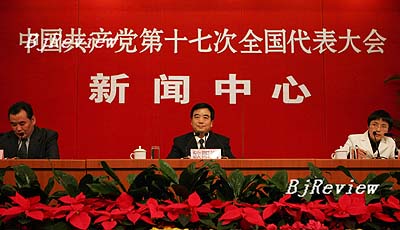|

The Communist Party of China (CPC) will further its efforts to enhance intra-Party democracy on the basis of achievements from previous pilot projects, a senior Party official said on the sidelines of the 17th National Congress of the Party on October 15-22.
Speaking at a press conference on October 17, Ouyang Song, deputy head of the Organization Department of the CPC Central Committee, revealed that direct election of the leading members of grassroots Party organizations has been experimented with in more than 300 towns and townships and some of their successful electoral procedures were adopted in the latest reshuffle of the CPC's grassroots organizations nationwide.
"We will actively explore a mechanism for cadre selection that ensures people's right to know, participate in, choose and supervise so that the process reflects the wishes of common people," he added.
According to statistics released by the Organization Department of the CPC Central Committee, about 15,000 CPC members ascended to leading positions through open elections from 2003 to 2006, of which more than 390 were prefectural-level cadres and about 3,800 worked at leading positions at county level.
The Party has made it compulsory to solicit ordinary members' recommendations and opinions for selecting cadres, aiming at increasing transparency and efficiency. Other methods, including door-step surveys and publication of survey results, appraisals of work performances in probation and secret voting by all members of local Party committees, have also been employed and promoted in the elections for better assessment of the candidates.
Between 2003 and 2006, a total of 9,378 cadres were punished in China for violating rules in the recruitment, promotion and management of personnel, said Ouyang. He did not elaborate on the cases, which often involve corruption and under-the-counter deals to buy off promotions and recruit people with special connections.
To enhance supervision of Party cadres, Ouyang listed some already widely-accepted measures, including submission of self-evaluation reports by officials on a routine basis and stricter auditing to prevent officials from making undeserved money.
The official reiterated that the CPC is determined to enhance the transparency of its work, continue the reform of its intra-Party system and facilitate vote-based decision-making, in hopes of diversifying the ways to realize intra-Party democracy.
The CPC, founded in 1921, now has more than 70 million members, who account for about 5.5 percent of China's total population.
"The Party pays more attention to the quality, instead of the quantity, of its members," Ouyang stressed.
Saying Party members cannot enjoy extra benefits over non-CPC people, he explained that many people join the CPC because they agree with the Party's theories and objectives and believe the Party is able to lead the Chinese nation to realize its long-expected great rejuvenation.
The great changes taking place in China in the past 30 years of reform and opening up are results of the hard work of the whole country and it should also be attributed to the leadership of the CPC, Ouyang continued.
Over the past decade, the CPC membership has grown at about 2.2 million year on year, while the growth is much remarkable in the non-state economic sector.
According to Ouyang, CPC members working at collectively-owned, private and foreign-funded enterprises total 3.18 million at present, an increase of 1.69 million or 113.4 percent over 2002.
But people in and outside the CPC are equally entitled to participate in state affairs, the official said, citing examples of Wan Gang and Chen Zhu, the first two non-Communist ministers in China's cabinet since the 1970s.
Wan, Minister of Science and Technology and an auto technologist, is vice chairman of the Central Committee of China Zhi Gong Dang, one of China's eight democratic parties, and Chen, Minister of Public Health, is a world-recognized hematologist without party affiliation.
"Wan and Chen both have solid academic backgrounds, leadership capability and good working style," Ouyang said. "Our Party will continue choosing more qualified experts from outside the CPC to work for the government."
China now practices a system of multi-party cooperation and political consultation under the leadership of the CPC. Members of democratic parties and non-party people can have a say in all state affairs. Besides government posts, non-CPC members are also elected to national and local legislative and advisory bodies and assume posts in procuratorial and judicial organs of all levels.
Ouyang also told the press conference that significant achievements have been made in the endeavor to foster the Party's clean and honest governance style and anti-corruption efforts, and the progress in this field is especially evident in the investigation of major and serious corruption cases and ferreting out corrupt officials.
It is reported that CPC discipline inspection organs at all levels investigated 133,467 Party officials, including 7,520 ones who were ranking members of management of state-owned enterprises, between 2003 and 2006. According to results of the investigations, 2,585 were dismissed or demoted, 1,363 were disciplined in line with Party regulations, and 427 who severely violated Party regulations and broke laws were transferred for judicial investigation. | 